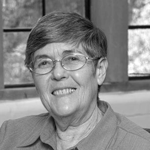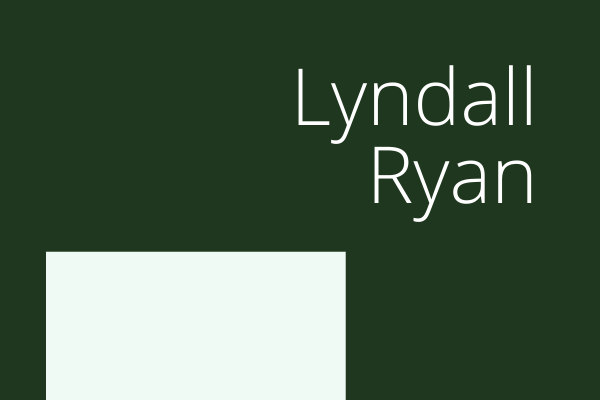Elizabeth Anne Webby (née Loder, 9 February 1942-6 August 2023) was born in Sydney to Betty [née Ellis) and George Loder. Her father enlisted in the RAAF in 1941, trained as a navigator, and was posted to 156 Pathfinder Squadron RAF based in Cambridgeshire. He was awarded the Distinguished Flying Cross in November 1943. The following month, his Lancaster bomber failed to return from an operational sortie over Frankfurt.[1] Three year old Elizabeth was presented with this medal at Admiralty House, Sydney, by the newly installed Governor-General, the Duke of Gloucester, in 1945.
Betty Lo der married again, to Stanley Ellis, a farmer at Tarcutta, and Elizabeth grew up with half-siblings Susan, Janet and Robert. She went as a boarder to the Presbyterian Ladies College, Croydon, in 1953, and gravitated to the Aurora Australis School Magazine, in which she published poems and a story during her time at the school. In a sign of things to come, she was a member of the editorial committee in 1955 and 1958. In the 1958 issue, her peers described her in words that remained applicable throughout her life: “She reads much; She is a great observer.”
der married again, to Stanley Ellis, a farmer at Tarcutta, and Elizabeth grew up with half-siblings Susan, Janet and Robert. She went as a boarder to the Presbyterian Ladies College, Croydon, in 1953, and gravitated to the Aurora Australis School Magazine, in which she published poems and a story during her time at the school. In a sign of things to come, she was a member of the editorial committee in 1955 and 1958. In the 1958 issue, her peers described her in words that remained applicable throughout her life: “She reads much; She is a great observer.”
Elizabeth enrolled in the Faculty of Arts at The University of Sydney in 1959, majoring in English and Psychology, and earning First Class Honours in English Literature in 1962. Her dissertation was on Patrick White, a choice which signalled the specialisation in Australian Literature that was to be her life’s work. Her identification with her subject was extraordinarily complete, succinctly characterised in the citation for the award of Membership of the Order of Australia in the 2004 Australia Day Honours, for “service to the study, teaching and promotion of Australian literature, for supporting Australian authors and for fostering links between the academic and general reading communities”.
By the time she had taken her doctorate, Elizabeth had staked her claim to authority across the history of literature in Australia, in English, from the earliest days into the twenty-first century. During her undergraduate years The University of Sydney had no undergraduate courses in Australian Literature, though there were Australian texts on the curriculum (for instance, the English I course that Elizabeth and I took in 1959 had some Australian content, including Douglas Stewart’s 1944 radio play, The Fire on the Snow). Elizabeth’s training was in an orthodox Oxford-inflected English literature and language curriculum, Anglo-Saxon and all. Her decision to write on a contemporary author for her Honours thesis was commonplace: to choose an Australian author rather than an English or American one was notable. In 1962 White’s reputation as a novelist was not yet consolidated, though Riders in the Chariot, published the previous year, was highly successful, as was the inaugural professional production of his play The Ham Funeral at the Palace Theatre in Sydney in the winter of 1962.[2] It happened that I attended the same performance as Elizabeth, and recall her delighted exclamation at interval, “Nettles and milk!”, identifying imagery in the play that she had isolated elsewhere in White’s writing, the significance of which she was to articulate in her thesis and in her first article, “The Ham Funeral: Its Place in the Development of Patrick White” (“The imagery of milk and nettles which is associated with sensuousness”).[3]
There is a moral to be drawn here: Elizabeth’s publishing debut was on a controversial mid-career Australian writer, subsequently to become our first and so far only winner of the Nobel Prize for Literature. She proceeded to candidature for the degree of Master of Arts (Honours), completing her thesis in two years.[4] This time she chose a canonical woman writer of the early twentieth century, Henry Handel Richardson (Ethel Florence Lindesay Richardson) – and there is a continuity here with the intellectual histories of her two predecessors in the Australian Literature Chair, the foundation professor, G.A. Wilkes (1962-66), and Dame Leonie Kramer (1968-89). Wilkes’s Sydney Honours thesis was on Richardson, as was Kramer’s Melbourne Master’s thesis. But each of them set Australian literature aside and went on to Oxford doctorates on early modern English literature; then they both taught mostly English literature before taking up the Australian Chair. Elizabeth almost took a similar path. However, she declined a travelling scholarship to University College London to do her PhD on Jacobean drama; marriage and a Sydney doctorate being her chosen alternative.
I recall someone’s commenting, around 1970, “Of course, Elizabeth is earning a PhD and bar”. A witticism, and a pertinent one. The thesis, submitted in 1971, was a massive ground-breaking exercise entitled “Literature and the reading public in Australia 1800-1850: a study of the growth and differentiation of a colonial literary culture during the earlier nineteenth century”. Versions of some of it had already been published in two articles in Southerly, in 1967 and 1969. Two more followed in 1976, thus putting much of the substance of the thesis into circulation. Much of the research for the thesis was carried out at the State Library of New South Wales (bear in mind that this is before the internet revolutionised such scholarly activity), and the association with the State Library and its staff was to be a long one. A further publication extending Elizabeth’s doctoral research was the important work of scholarship, Early Australian Poetry. An annotated bibliography (Hale & Iremonger, 1982). In some ways an even more significant volume generated out of Elizabeth’s unparalleled knowledge of writing of the colonial period is her anthology, Colonial Voices: Letters, Diaries and Other Accounts of Nineteenth-Century Australia (University of Queensland Press, 1989).
Colonial Voices exemplifies the studies of nineteenth-century Australian literature which are recognized as the foundation of Elizabeth Webby’s reputation, together with the related work on the history of the book in Australia. But my point here concerns the way Elizabeth from the very beginnings of her career ranged right across Australian literature, her authority soon documented in such enterprises as her editorship of The Cambridge Companion to Australian Literature (Cambridge University Press, 2000). Her influence was considerable, evident both in her published writing and in collegial conversations as well as the published work of others.
It is curious to reflect that there were times when Elizabeth Webby was undervalued. While she first tutored in the English Department at The University of Sydney in 1965, her appointment to a Lectureship came only in 1974, and her appointment to the Chair in 1990 was a close-run thing. By that time, her publications had been expanded into discussions of the short story, women’s writing, Australian theatre and drama (an abiding interest that extended to film), and New Zealand writing, including but not limited to Janet Frame. She had played a leading role in a major bicentennial publication, The Penguin New Literary History of Australia (1988), jointly edited with L.T Hergenhan and others. She was President of the Association for the Study of Australian Literature from 1988 to 1990, having been a founder member: her role in ASAL was recognised by the conferral on her of Honorary Life Membership in 2003, simultaneously with the A.A. Phillips Award for contributions to Australian literature. Election as a Fellow of the Australian Academy for the Humanities in 1997 testified to her standing in the humanities generally. She was elected to the Academy Council in 2007, was Vice-President in 2008-09, and in 2010 took on the position of Editor which she filled until 2016.
Elizabeth’s work as Editor reprised her editorship of the journal Southerly, which she assumed in succession to G.A. Wilkes in 1988, continuing to 1999 (Ivor Indyk was joint editor in 1994-95). She continued to serve as an Editorial Adviser for some years, taking on the same role for half a dozen other journals in Australia and the United Kingdom. She never regarded Southerly as solely or even principally a literary critical journal (though until the inception of Australian Literary Studies in 1973 many would have seen it in this light), relishing the opportunity to publish coming writers as well as established ones. The journal flourished under her editorship, increasing in size, with a good deal of the business of the journal, and most of the copyediting and proofreading done by the editor herself.
During her tenure of the Chair, Elizabeth’s research activity took on new dimensions, with her involvement in a number of major infrastructural projects such as the setting-up and development of the extraordinary resource AustLit (www.austlit.edu.au), a collaboration of eleven universities and the National Library of Australia, supported at different times by Australian Research Council and other grants; and initiatives like the reprint series Classic Australian Works, initially a partnership of Sydney University Press and the Copyright Agency Limited. Her work in and for her subject continued, seemingly unabated, for instance with an Australian Research Council Linkage Grant, “Australian Poetry: Production, Distribution and Reception”, held with colleagues from libraries and in partnership with the Copyright Agency Limited. Another multi-faceted ARC-funded project with Professor Paul Eggert of UNSW Canberra on electronic editing, especially of Harpur and Lawson, led to the full-scale critical edition, with Eggert, of Robbery Under Arms, by Rolf Boldrewood (University of Queensland Press, 2006).
Whatever the administrative and other demands on her time, she maintained a significant presence in the classroom, delivering the curriculum she was instrumental in shaping. An effective lecturer, she was probably even more effective in the relative informality of seminars and tutorials. and she was famously available for advice and consultation, with honours and postgraduate supervision her forte. Many of those supervised by her, along with those who studied within the ambience for which she was responsible, are prominent in academic and other arenas of Australian cultural life.
There’s a lot that goes with the territory, including examining of endless PhDs, all done by Elizabeth with her usual equanimity and efficiency. I have already alluded to her substantial engagement with literary activities beyond the University. Her engagement diary made exhausting reading, with committee work (to name only one activity, as Patron 1993-99 and Chair 1995-96 of the NSW Writers’ Centre), judging of literary awards (notably, but not only, the Nita B. Kibble awards for women’s life writing, which she was instrumental in setting up), participation in writers’ festivals and similar events, launching numerous books – and on and on. In other less evident but no less effective ways she constantly encouraged and promoted Australian writers and the production of Australian literature, along with the understanding and appreciation of it.
Then there were the ways not taken, like the administrative route. Her baptism in administrative matters came as a Sub-Dean in the Faculty of Arts in 1984-85, an office rapidly succeeded by her becoming Pro-Dean in 1986-87, and again in 1994-96 and 2000-02. Such involvement in the Faculty tells only part of the story: she served on innumerable appointment and promotion committees in her own university and others, and many reviews and policy bodies both at Sydney and elsewhere, her cool head and informed judgement highly valued. She might have sought the role of Dean, or a hyphenated one (she was heard to say “I could have been a Vice-Chancellor”), but for her commitment to Australian studies and her diffidence about the ceremonial elements of such jobs A decisive thinker, with a quick grasp of the essentials of a situation, she was occasionally peremptory but never unreasonable – and numerate into the bargain.
Elizabeth retired in 2007 and embarked upon an extensive program of travel within Australia, New Zealand, and the United States. There were lengthy visits to her son Richard in the United States, and daughter Rosalind in Darwin, with their spouses Christine and Sajeel and families. She maintained her prowess as a cook (her pavlovas were famous), and her interest in classical music, alongside positions such as Patron of the Fellowship of Australian Writes NSW, and membership of the committee of International PEN Sydney. Her research came full circle, back to Patrick White. The ARC-funded project, “Patrick White in the Twenty-first Century”, with Margaret Harris, focussed on White’s working notebooks and other manuscripts in the NLA, and as well as academic articles led to the publication of his previously unpublished novel, The Hanging Garden (Knopf, 2012). Her last major publication was another of her several collaborations with junior colleagues, Eliza Hamilton Dunlop: Writing From the Colonial Frontier, edited with Anna Johnston (Sydney University Press, 2021).
Elizabeth is survived by her husband Barry, their children, and five grandchildren, together with her Ellis siblings and their families. She will be much missed by friends, colleagues and former students. One colleague summed up: “Her presence was felt everywhere in our field.”
Emeritus Professor Margaret Harris FAHA
I am grateful for permission from the editor of Southerly to draw extensively on my essay “Professing Australian Literature: The Webby Way”, Southerly (2007), 65: 1-2, pp. 8-13.
[1] https://www.awm.gov.au/collection/C1228199
[2] For more information, see David Marr, Patrick White: A Life (Sydney: Random House, 1991), pp. 392ff.
[3] Elizabeth Loder (Webby), “The Ham Funeral: Its Place in the Development of Patrick White”, Southerly 23 (1963), p. 86.
[4] Three articles resulted from this thesis (In Southerly 1965 and 1966, and Balcony 1966). About this time, Elizabeth drafted a critical monograph on H.H. Richardson which has not been published. With Gillian Sykes, Elizabeth edited Walter and Mary: The Letters of Walter and Mary Richardson (Melbourne University Press, 2000).



